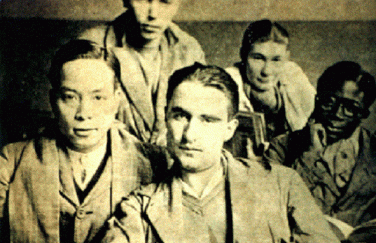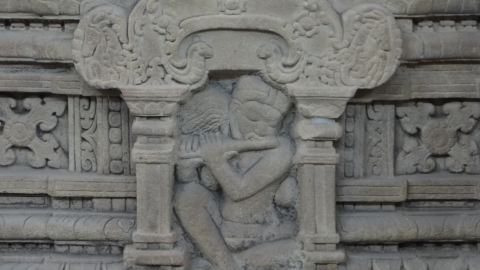Kelly Nguyen
September 23, 2020
A groundbreaking new article written by Brown University classicist and graduate student Kelly Nguyen explores classical reception in and beyond Vietnam for the first time. In the process, she adds “Vietnamese voices to [the] ongoing discourse on the accessibility of classics.”[1] She spoke with the SCS blog's EIC, Sarah Bond, about her new article, how she became interested in classical reception within Vietnamese literature, and the “double-edged sword” of the cultural capital held by the field of Classics.
What got you interested in studying the intersection of Vietnamese literature and Classics? How did Phạm Duy Khiêm initially come to your attention?
It was honestly my exasperation from having classicists, upon finding out that I am Vietnamese, ask me whether or not I had read Jonathan Shay’s Achilles in Vietnam. Yes, I had read it –or rather, struggled through it as I had to brace myself for every “gook” that popped up in the veterans’ accounts of the Vietnam War. Although I recognize the utility of ancient Greek literature for processing war trauma, Shay’s work reinforces the disremembering of Vietnamese people: for while Shay’s work memorializes the experiences of American veterans of the Vietnam War, elevating their trauma to the register of Greek mythology, it relegates Vietnamese people to the margins of history, either victimizing or demonizing them. The index of Achilles in Vietnam is telling enough of how Vietnamese people are actively disremembered in his work, and more broadly, within the American imagination: “Vietnamese” does not appear as a standalone gloss—in its place is “Vietcong,” with the additional gloss “See enemy, Vietnamese.” Of all the classicists who have asked me about Achilles in Vietnam, how many of them have noticed this detail? How many of them have noticed the disremembering of Vietnamese people?
My research emerged out of this exasperation, but then evolved into a desire to ethically remember Vietnamese people –even, or perhaps especially, within a field such as ours, a field that has not only historically been Western-centric, but has also been used to sanction violent societal structures, such as racism and imperialism. Why has Vietnam not appeared in our field except as a metonym for the Vietnam War? This was especially baffling to me since Vietnamese is one of the few Asian languages whose national written script has officially been Romanized. On top of that, there was a history of French colonization in Vietnam and the role that Greco-Roman antiquity played in its mission civilisatrice (e.g. the French Empire’s narrative of inheriting the Roman Empire, the role of Greek and Latin in colonial schools). My initial research into this seemingly forgotten history led to me to Phạm Duy Khiêm, who was the first Vietnamese person to receive a degree in Greek and Latin. He had excelled so well in Classics that he went on to study at the prestigious École Normale Supérieure in Paris and later taught Greek and Latin in Vietnam and France. I became interested in the paradoxical roles that Classics played in his life, how it served as both a gatekeeper and as a cultural bridge, as both a tool of acculturation and of resistance, and as a space of belonging and exile.

Figure 1: Pham Duy Khiem (far left), with Georges Pompidou (centre) and Léopold Senghor (far right), circa 1931 (CC-SA-4.0).
Could you explain how you think the “cultural capital” of Classics can be and in fact was used to explain other cultures, such as Vietnamese culture, to European colonizers such as the French?
The “cultural capital” of Classics was and continues to be a double-edged sword. On the one hand, the use of Classics as a cultural translator helps make a non-Western context more understandable and more palatable to a Western audience (I’m extrapolating here to Western audience because this “cultural capital” is not only limited to Europe nor to modern colonial times). On the other hand, there is the looming risk of that Western “cultural capital” overshadowing the very culture that it is trying to “explain.” As Phạm Qùynh, another Vietnamese intellectual of Phạm Duy Khiêm’s generation, has asked, how do you translate without betraying? How do you use a “cultural capital,” one that was simultaneously forced upon you and yet excluded you, in a way that still respects the original non-western context? What I explore in my dissertation is this tension between the perceived value and the real threats of Classics for Vietnamese communities in and beyond Vietnam and the diverse ways that Vietnamese intellectual leaders have wrestled with that tension to challenge their exclusion and their erasure.
Your examples of imperial erasure in colonial Vietnam (e.g. through the education system) are incredibly poignant. Do you think we can look at the methods of, say, the French or British and draw parallels to similar Roman erasures in the name of empire and colonization?
Yes, definitely, though I’m not sure if they are parallels as much as borrowed rhetoric and strategies. Many of these European empires used Greco-Roman antiquity to build their imperial ideologies and to justify their colonizing agenda. The French, however, took it to the next level and elevated it to imperial doctrine. In my dissertation, I look at how French colonizing authorities racialized the Roman concept of humanitas to develop their concept of mission civilisatrice. Examining the afterlife of these ancient concepts has helped me better understand their nuances, but also their limits.
My next project actually has been influenced by my study of American imperialism and Vietnamese refugeehood. Although the U.S. accepted waves of Vietnamese refugees to assuage the American guilt of the Vietnam War, the current administration is turning away refugees from Central America, putting them in cages, in prisons, in so-called migrant camps, and ultimately denying them of their refugee status. The United States has since relinquished its long-standing role as the global leader in welcoming refugees by cutting the number of refugees admitted into the country to a record low—despite the fact that forced displacement is rising at unprecedented rates. And yet, the United States celebrates its foundation and identity as a land of refuge. How does a state whose identity is rooted in refugee history in turn justify its mistreatment of refugees? I aim to apply a necessarily interdisciplinary approach to analyzing this question but within the context of the Roman Empire. Stay tuned!

Figure 2: A Vietnamese family after their arrival from Manila, Waiting at Athens airport for their flight to Israel (CC SA 3.0).
What might the case study of Phạm Duy Khiêm tell us about how authors on the margins engage with traditional canons? I love your assertion that he used it to ultimately challenge perceived inferiority and to create a “third space.” Can you elaborate a bit more on this space?
Phạm Duy Khiêm was a part of a generation of Vietnamese intellectuals that struggled to reconcile their interculturality as they were caught between the poles of the colonizer and the colonized. Why Vietnam serves as a particularly illuminating case study is the fact that while French colonial administrators applied a tabula rasa, or blank slate, approach to subjugate other territories, in Vietnam, they had to reckon with the legacies of the Chinese empire, complete with its own classical canon, that were so deeply embedded in Vietnamese society. In my dissertation, I explore the subsequent “battle of the classics” that resulted from the meeting of two imperial powers. Should Sino-Vietnamese humanities continue to hold its primacy within Vietnamese education or should Greco-Roman humanities take its place in this new colonial reality? This question thus rendered Phạm Duy Khiêm’s interculturality even more difficult to navigate since it was not only stuck between Vietnamese and French cultures, but also between Sino-Vietnamese and Greco-Roman humanities. Choosing the latter meant being disconnected from the intellectual history and tradition of previous generations, and yet choosing the former meant being shut out from the colonial socio-economic ladder. Phạm Duy Khiêm’s generation therefore had to create this “third space” in order to survive in a society built upon violent structures of erasure. In my mind, the “third space” is a space where one’s interculturality could exist: where one could, temporarily at least, transcend the “politics of polarity” that sought to maintain the division between colonizer and colonized. This space gets linked with concepts like “hybridity,” but I think “hybridity” gives a false sense of cohesion. I think the misconception of the “third space” is that it is a monolithic entity where people on the margin can fuse the disparate parts of their identities to fight back against The Man. What I’ve learned from Phạm Duy Khiêm is that the “third space” is fluid and dynamic—but also dangerous. What I did not mention in my article is that in the end, after all of the ostracization and racism, Phạm Duy Khiêm committed suicide while still in exile in France.
In the postcolonial chapters of my dissertation, I explore how contemporary Vietnamese artists from the diaspora engage with the Greco-Roman canon. These authors are acutely aware of the dangers of engaging with this Western canon, but unlike their predecessors from the French colonial period, they are not using classical allusions for the sake of translation or mediation. Their intended audience is no longer the French or members of the dominant culture. For example, Linda Lê, one of the authors whose work I examine, states that her ideal reader is her Vietnamese father, who actually cannot read her work since he does not know French. By writing for her father, she is writing for a community of exiles, of people dispossessed of their homeland after centuries of imperialism that had already dispossessed them of their heritage and of their worth. In reworking classical narratives, these postcolonial authors, like their colonial predecessors, challenge their exclusion from what continues to be perceived as white European culture—but they also take it one step further. In their rewriting, they are also challenging traditional interpretations of Greek and Roman literature, history, and culture, as well as pushing the boundaries of what comprises “Classics” the field.
Can you tell us a little bit more about your dissertation, Vercingetorix in Vietnam: Classical Inheritance and Vietnamese Ambivalence?
My project explores how Vietnamese communities, both in Vietnam and in the diaspora, have contended with the legacy of Greco-Roman antiquity from the French colonial era in the mid-19th century to the present post-colonial moment. I examine how French colonial administrators racialized Greco-Roman antiquity to devalue Vietnamese culture and to dismantle Sino-Vietnamese classics. I argue that Vietnamese political and intellectual leaders, in turn, used their classical education to negotiate their space within their colonial reality. Within postcolonial modernity, I investigate how members of the diasporic Vietnamese community have reworked Greek myths to explore their transnational identities as well as to counteract contemporary socio-cultural myths that deny Vietnamese personhood. I demonstrate the ways that these diasporic Vietnamese writers have become mythmakers themselves, transforming well-known Greek myths into an empowering space for their subjects and themselves, as they assert their experiences within Western memory.
[1] Kelly Nguyen, "Phạm Duy Khiêm, classical reception, and colonial subversion in early 20th century Vietnam and France,” Classical Receptions Journal, Volume 12, Issue 3, July 2020, Pages 340–356.
Authors


